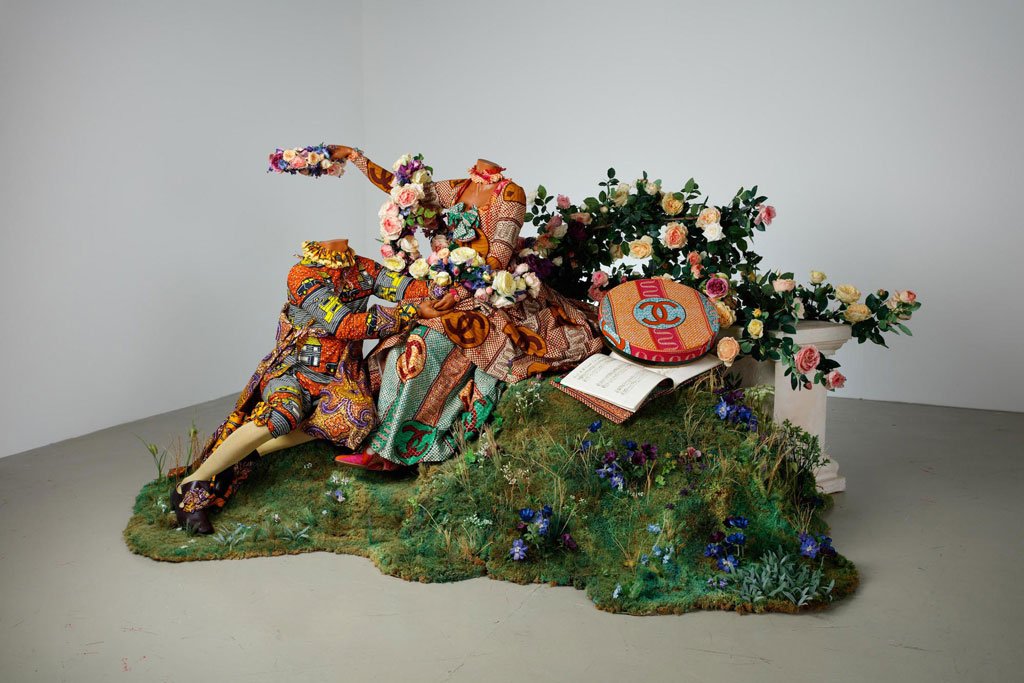CAN ARTISTS LIVE FROM THEIR WORK, OR DO THEY ALL NEED A SECOND JOB?
Art by Yinka Shonibare
Whether or not an artist can live from their work depends on a variety of factors, including their skill level, genre, target audience, and marketing strategy. The image of the struggling artist, scraping by with a meagre income and relying on a second job to make ends meet, has long been a stereotype associated with the world of creative expression. While it is true that many artists face financial challenges, the idea that all artists need a second job to survive is an oversimplification of a complex reality. In this article, we will explore the financial realities of being an artist and examine whether artists can indeed live from their work or if a second job is a necessity for most.
The Diverse World of Artists
Artists come in all shapes and sizes, with a wide range of talents and artistic pursuits. From painters to musicians, writers to sculptors, the art world is incredibly diverse. As a result, the financial prospects for artists can vary significantly depending on their chosen medium, their level of skill and recognition, and the current market for their work.
Financial Challenges
It's important to acknowledge that many artists face financial challenges that can make it difficult to live solely from their creative work. These challenges include:
Irregular income: Artists often do not have a steady stream of income. They may have periods of high sales or commissions followed by lean times when their work is not in demand.
Market fluctuations: The art market can be unpredictable, with trends and tastes changing over time. Artists who rely on a specific style or medium may struggle if their work falls out of favour.
High costs: Creating art can be expensive, especially for materials and studio space. Many artists invest a significant portion of their income back into their work.
Limited access to healthcare and benefits: Freelance artists often lack access to health insurance, retirement plans, and other benefits that traditional employment provides.
Competition: The art world is highly competitive, and not all artists achieve the level of recognition needed to sustain a comfortable living solely from their work.
Successful Artists Living Off Their Work
El Anatsui (Ghana) is a sculptor known for his large-scale works made from recycled materials such as bottle caps and aluminum foil. His work explores themes of African identity and culture. Anatsui's work has been exhibited in galleries and museums all over the world, and he is one of the most acclaimed African artists of his generation.
Njideka Akunyili Crosby (Nigeria-American) is a painter known for her realistic and intimate portraits. Her work often explores themes of family, identity, and migration. Crosby's work has been exhibited in galleries and museums all over the world, and she is one of the most sought-after artists of her generation.
Victor Ehikhamenor (Nigeria) is a painter and sculptor known for his work that blends traditional African motifs with contemporary art. His work often explores themes of spirituality, culture, and identity. Ehikhamenor's work has been exhibited in galleries and museums all over the world, and he is one of the most respected Nigerian artists of his generation.
Abdoulaye Konaté (Mali) is a sculptor known for his large-scale works made from recycled materials such as metal and plastic. His work often explores themes of social and environmental justice. Konaté's work has been exhibited in galleries and museums all over the world, and he is one of the most important African artists of his generation.
Yinka Shonibare CBE (British-Nigerian) is a sculptor, photographer, and filmmaker known for his work that explores themes of race, class, and colonialism. Shonibare's work has been exhibited in galleries and museums all over the world, and he is one of the most successful West African artists of his generation.
While it is true that many artists face financial challenges, there are also numerous examples of artists who have achieved financial success and are able to live comfortably from their creative work. These artists have often combined talent, perseverance, and a solid understanding of the art market to make a living. Here are some factors that contribute to their success:
Recognition and demand: Artists who gain recognition and build a strong following can command higher prices for their work and secure commissions, ensuring a more stable income.
Diversification: Some artists diversify their income streams by selling prints, merchandise, teaching workshops, or licensing their work for commercial purposes.
Grants and residencies: Many artists apply for grants, residencies, and fellowships, which can provide financial support and the time and space to focus on their creative work.
Gallery representation: Working with reputable galleries can help artists reach a wider audience and sell their work at higher prices.
Patrons and collectors: Building relationships with collectors and patrons who support and invest in an artist's work can provide financial stability.
Here are some additional tips that may be helpful for artists who are struggling to make a living from their work:
Consider offering affordable art products and services. In addition to selling original works of art, you can also offer prints, commissions, and other services to make your art more accessible to a wider range of buyers.
Teach art classes or workshops. This is a great way to share your knowledge and passion for art with others, and it can also be a good source of income.
Work part-time in a related field. This could be a job in a gallery, museum, or framing shop. A part-time job in the art world can help you stay connected to the scene and network with other people in the industry.
Develop your skills and craft. The better your art is, the more likely people are to be interested in buying it. Take classes, workshops, and other opportunities to learn new skills and improve your technique.
Find your niche. What type of art are you most passionate about creating? What kind of art do people seem to be most interested in? Once you've found your niche, focus on creating unique and high-quality art.
Build a strong online presence. Create a website or blog to showcase your work and connect with potential buyers. Be active on social media and share your work with others.
Network with other artists and art professionals. Attend art shows, festivals, and other events to meet other artists and learn about new opportunities. Get to know gallery owners, curators, and other people who can help you sell your work.
Be patient and persistent. It takes time to build a successful art career. Don't get discouraged if you don't start selling a lot of work immediately. Keep creating art and promoting your work, and eventually, you will start to see success.
It is important to note that there is no one-size-fits-all answer to the question of whether or not artists can live from their work. Some artists are able to make a good living from their work, while others struggle to make ends meet. It really depends on the individual artist and the factors mentioned above.
The question of whether artists can live from their work without needing a second job is not a straightforward one. While many artists face financial challenges due to the irregular nature of the art market and the high costs associated with their craft, there are successful artists who have managed to make a comfortable living from their creativity. It is essential to recognize that the path to financial success in the arts can be challenging and may require a combination of talent, dedication, networking, and business acumen.
Ultimately, whether an artist can live solely from their work depends on various factors, including their level of recognition, their ability to adapt to market fluctuations, and their willingness to diversify their income sources. While the image of the struggling artist persists, it is important to remember that the art world is as diverse as the artists themselves, and success can take many different forms.
If you are an artist who is passionate about your work and is willing to put in the hard work, it is possible to make a living from your art. However, it is important to be realistic about the challenges involved and to have a backup plan in case you are not able to make a full-time living from your art right away.

